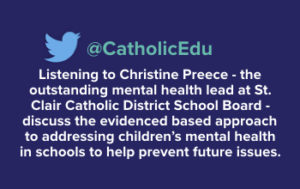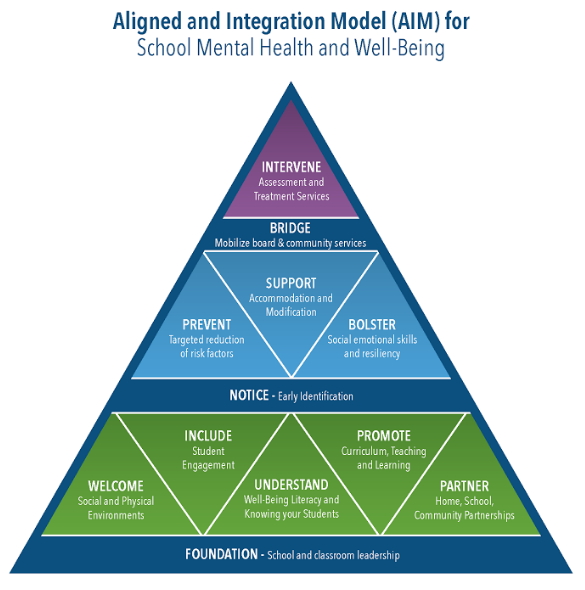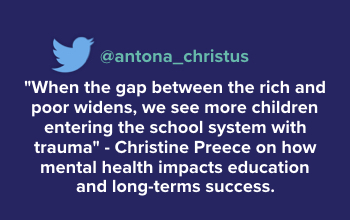Supporting mental health in our schools
By Claire Angus, People for Education board member
 Students’ mental health has an impact on both their education and their long-term success. At People for Education’s annual conference, Christine Preece, Mental Health and Well-being Systems Lead for the St. Clair Catholic school board, led a workshop about the role schools play in supporting students’ mental health and well-being.
Students’ mental health has an impact on both their education and their long-term success. At People for Education’s annual conference, Christine Preece, Mental Health and Well-being Systems Lead for the St. Clair Catholic school board, led a workshop about the role schools play in supporting students’ mental health and well-being.
The emphasis of the session was laid out early: In order to create the best learning environment, both students and teachers need to be healthy. Health includes both mental and physical health, and mental health is as important as physical health. However, administrators and teachers may feel that they do not have the capacity to address the range of complex and challenging issues that encompass student mental wellness. School boards recognize this, and are working to provide the tools and resources needed to create a positive learning environment.
Evidence-based approaches to promote student mental health
 School Mental Health-ASSIST is a “provincial implementation support team designed to help Ontario school boards to promote student mental health and well-being.” They have developed a research-based framework that is being implemented across Ontario. The Aligned and Integrated Model for School Mental Health and Well-Being is a tiered approach: from universal mental health promotion for all students, to targeted preventive interventions for students at risk, to more intensive, clinical intervention for the most vulnerable students (see diagram).
School Mental Health-ASSIST is a “provincial implementation support team designed to help Ontario school boards to promote student mental health and well-being.” They have developed a research-based framework that is being implemented across Ontario. The Aligned and Integrated Model for School Mental Health and Well-Being is a tiered approach: from universal mental health promotion for all students, to targeted preventive interventions for students at risk, to more intensive, clinical intervention for the most vulnerable students (see diagram).
The model recognizes that starting with welcoming, including, understanding, promoting, and partnering is not just necessary for some students – it is good for all students. The idea is to build mental health literacy (the capacity to recognize, prevent, and manage mental illness) among students, staff, and parents.
Invest now or pay later
The AIM framework emphasizes the value of an upstream investment in mental health, and every school board in Ontario has a mental health lead doing this upstream work. Christine, who is the mental health lead for her board, explained that the St. Clair Catholic board is taking an approach of “listen, learn, refer.” It acknowledges that educators are not practitioners, but every teacher needs to be able to recognize the needs of a student and refer them to the appropriate resources. A key element is “do no harm” – make sure that the resources and supports for students are evidence-informed and sensitive to their needs.
 The participants in this workshop were passionate individuals who were deeply invested in ensuring that mental health needs are recognized and addressed in the learning environment. The questions asked, examples used, and frustration expressed by some of the participants helped all of us to understand the complexity of the issue and the need to continue to develop programming and resources that will serve the needs of all students.
The participants in this workshop were passionate individuals who were deeply invested in ensuring that mental health needs are recognized and addressed in the learning environment. The questions asked, examples used, and frustration expressed by some of the participants helped all of us to understand the complexity of the issue and the need to continue to develop programming and resources that will serve the needs of all students.
Further reading:
- see Christine Preece’s presentation slides.
- read the paper by Bruce Ferguson and Keith Power on schools’ role in promoting physical and mental health.
- learn more about the resources available from School Mental Health-ASSIST.
